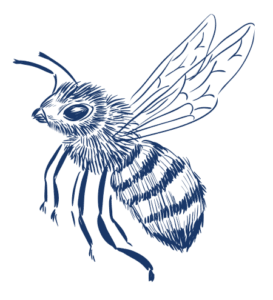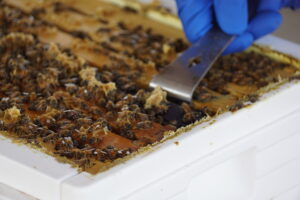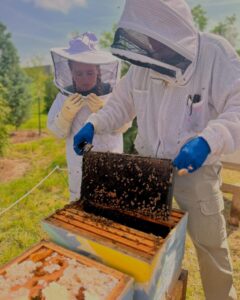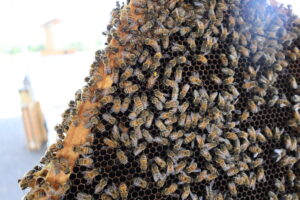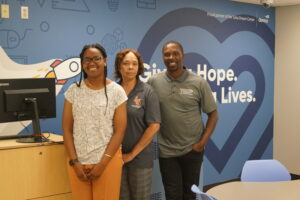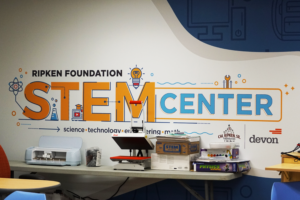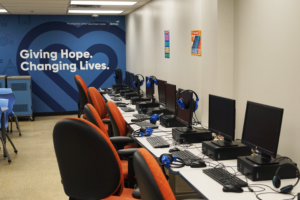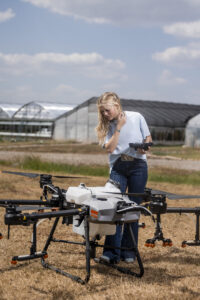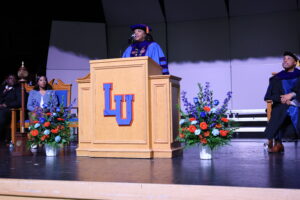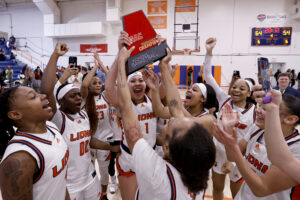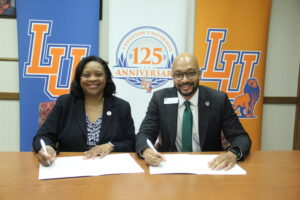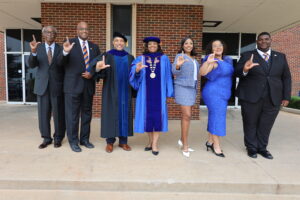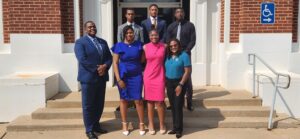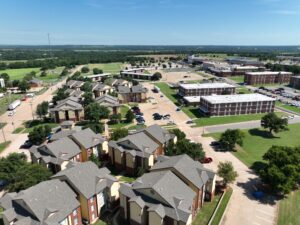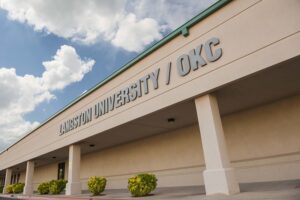
Langston University receives $3.125 million in grants to support rehabilitation programs, student scholarships
OKLAHOMA CITY–Langston University’s Department of Rehabilitation and Disability Studies earned $3.125 million in grants from the U.S. Department of Education to support the university’s rehabilitation programs, including funding 96 full-tuition scholarships over the next five years.
The department has been awarded three grants; one is from the Office of Special Education and Rehabilitation Services (OSERS), and two are from the Rehabilitation Services Administration (RSA).
The first grant, funded through the RSA and totaling $1 million over five years, will establish a specialized Pre-Employment Transition Services to Youth with Mental Disabilities track within the department’s master’s program for Rehabilitation Counseling. This will include funding the tuition, fees and a living stipend for 30 graduate students over five years.
The second grant, worth $1.25 million and funded by OSERS, will establish a new track within the undergraduate Rehabilitation Services bachelor’s degree program. The new track will be School-to-Work: Preparing Personnel to Serve School-Age Children with Intellectual and Developmental Disabilities, and the grant will fund the tuition, fees and a living stipend for 36 undergraduate students over the next five years.
The last grant is from the RSA and will pay out $875,000 over five years. This grant will establish another new track within the Rehabilitation Services program: Pre-Employment Transition Services to Youth with Intellectual and Developmental Disabilities (including Autism). It will fund 30 undergraduate scholarships over the next five years, which will include tuition, fees and a living stipend.
“Langston University is honored to receive this transformative investment from the U.S. Department of Education,” said President Ruth Ray Jackson. “These three grants reflect our unwavering commitment to preparing highly qualified professionals who will serve youth with mental, intellectual, and developmental disabilities.
“I commend Dr. Corey Moore and the Department of Rehabilitation and Disability Studies for their leadership in advancing inclusive education and workforce development. This funding strengthens our mission as a land-grant institution and expands access to high-impact academic programs that meet urgent national needs.”
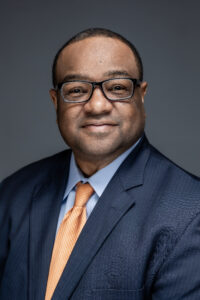
Undergraduate students interested in the Rehabilitation Services program who wish to apply for the scholarships within either track must have completed at least 41 hours of general education courses prior to applying. Interested individuals should contact Professor Emanual Lewis, the Rehabilitation Services Program Coordinator at LU-Tulsa, via phone at 918-902-3184 or via email at emanual.lewis@langston.edu.
Graduate students interested in the new track within the Rehabilitation Counseling program should contact Dr. Andre Washington, the Rehabilitation Counseling Program Coordinator at LU-OKC, via phone at 405-530-7525 or via email at andre.washington@langston.edu to apply for scholarships.
“The awarding of these grants, especially three at the same time, speaks to the relevance and value of the work being done here at Langston University in the Department of Rehabilitation and Disability Studies,” said Dr. Elizabeth Albright, Interim Dean of the School of Education and Behavioral Sciences. “These scholarships enhance what Langston University already does to support students through degree completion. By providing financial support, not only are students able to graduate without adding debt, but they will be stronger in their field because their primary focus can be school.”
LU’s Rehabilitation Counseling graduate program is celebrating its 25th anniversary, and it was recently ranked by U.S. News and World Report as a Top 20 rehabilitation graduate program in the nation. Accredited through CACREP, the graduate program has also birthed two Rehabilitation Research and Training Centers (RRTC) that are both funded by the National Institute on Disability, Independent Living and Rehabilitation Research.
These new grant projects present an exceptional approach to student development through LU’s partnership with the Oklahoma Department of Rehabilitation Services, Tulsa Public Schools and other local education agencies. Significant attention will be devoted to cross-fertilizing these academic initiatives and ongoing RRTC trainings to increase students’ knowledge of the delivery and transition of mental health and developmental disability support services to school-age children and youth.
The goal is to improve the supply of fully credentialed rehabilitation, mental health and disability professionals for employment in local educational and/or rehabilitation agencies.
“These innovative federally funded educational initiatives are critical for training and preparing our undergraduate and graduate students within the department to help meet the demands of human service systems addressing the current national youth mental health crisis as well as the pre-employment service support needs of school-age children and youth with intellectual and developmental disabilities” said Dr. Moore, the Founding Chair of the Department of Rehabilitation and Disability Studies and project director for all three grants.
The OSERS priority focuses on personnel preparation for special education, early intervention and related services personnel at Historically Black Colleges and Universities, Tribally controlled colleges and universities, and other minority-serving institutions. The RSA priorities are consistent with the purpose of the Rehabilitation Long-Term Training program, which is to provide financial assistance for academic training areas of personnel shortages in vocational rehabilitation.
These funded initiatives at Langston University are in direct response to identified needs in personnel development, as well as to improve services and outcomes for school-age children and youth with mental, intellectual and developmental disabilities.

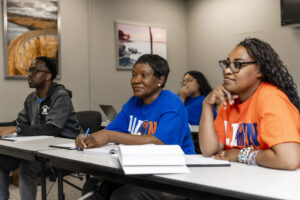
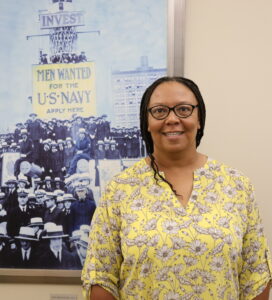
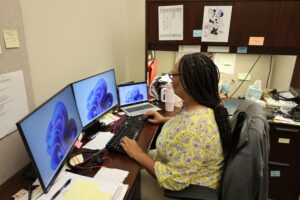
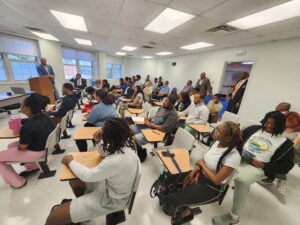
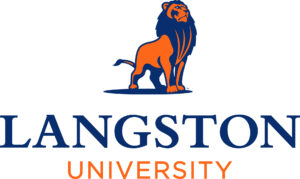 Langston University is Oklahoma’s HBCU. Made up of six academic schools, LU provides students with a world-class education that includes hands-on learning through impactful research and beneficial internships. The Langston University School of Business (LUSB) prides itself on producing change agents in the world of business. Nationally accredited by the Accreditation Council of Business Schools and Programs (ACBSP), LUSB offers more than 10 degree programs that prepare graduates to jumpstart their career goals. In 2025, LUSB graduates ranked in the top 1% nationally on the Peregrine Business Exam.
Langston University is Oklahoma’s HBCU. Made up of six academic schools, LU provides students with a world-class education that includes hands-on learning through impactful research and beneficial internships. The Langston University School of Business (LUSB) prides itself on producing change agents in the world of business. Nationally accredited by the Accreditation Council of Business Schools and Programs (ACBSP), LUSB offers more than 10 degree programs that prepare graduates to jumpstart their career goals. In 2025, LUSB graduates ranked in the top 1% nationally on the Peregrine Business Exam.

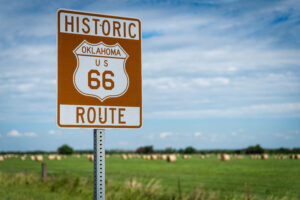
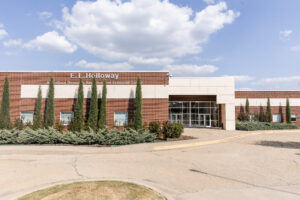
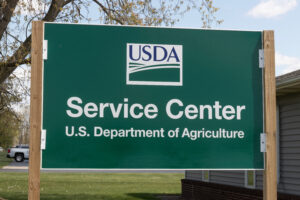

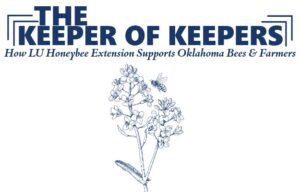
 From hobbyists to commercial growers, relocating honeybee colonies is just one of the many ways the Langston University honeybee extension program helps people all across Oklahoma.
From hobbyists to commercial growers, relocating honeybee colonies is just one of the many ways the Langston University honeybee extension program helps people all across Oklahoma.